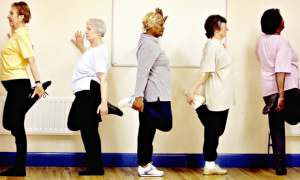
Older people will play an active part in our future. For students this means it time to rethink the stigma around working with older people. Photograph: Ian Waldie/Getty Images
There no escaping the fact that were getting older. There are ten million people in the UK who are over 65, and by 2050 this is predicted to have risen to 19 million, according to the government. In the UK and in developed countries around the world, an ageing population is the new reality. It a reality that poses challenges to society, but also unique opportunties for students and graduates.
There an image problem surrounding working with older people; it not something students necessarily think of as a career path. But if youre looking for a rewarding career in a growing field, it worth taking an interest in our ageing population.
“Ageing is integral to everything in society,†says Dr Paul Nash, postgraduate programme director in ageing studies at Swansea University. “If you want to make an impact in society you can make it directly through working with older adults, or indirectly through changing policy or challenging stereotypes. Also innovatively, by designing products that older people actually want and that address the needs of an older consumer base.â€
A number of postgraduate courses in gerontology, or ageing studies, teach students about the social and politicial implications of an ageing population, as well as providing modules in working directly with older people.
Healthcare and social work probably has the most obvious link to working with older people and having an impact on their lives. But specialising in geriatric medicine might not have been what you imagined when you first pictured becoming a doctor or nurse.
Dr Terry Quinn, lecturer in geriatric medicine at the University of Glasgow says: “There been a PR issue in the past. Geriatric care and the care of older adults hasnt been seen as exciting or sexy. It not cardiology or intensive care or the things that you see on TV that get people initially excited about healthcare.
“But actually it very rewarding and is the reality of contemporary healthcare. Most people receiving healthcare now are older adults.â€
As our population ages, there also an increase in demand for graduates who have the skills to deal with illnesses that particularly affect older adults, such as dementia.
Ian McMillan, head of division of occupational therapy and arts therapies at Queen Margaret Universitys, says: “As dementia becomes more prevalent in society it is critical that we ensure our healthcare graduates better understand the specific needs of people with dementia, their carers and their families.â€
Informing yourself about the specific needs of older adults, either by choosing modules on an undergraduate course or specialising in geriatric care at postgraduate level, will prepare you for the reality of a career in healthcare. But it can also be a particularly rewarding career path that you might not have considered.
“If you are a cardiologist you focus on one thing, but as a geriatric specialist you are potentially looking at a whole range of processes,†says Quinn. “That variety makes for an intellectuatlly stimulating and interesting job.â€
Dr Jenni Harrison is in her fourth year of postgraduate medical training at the University of Leciester, specialising in the care of older people. She says: “Geriatric medicine is not neccessarily something that grabs people as a thought of something they might like to do. But it a potentially very rewarding career in medicine.
“I enjoy speaking with a patient family and the holistic approach: making sure the patient has enough help at home and that their wider problems are looked at. It makes you feel like youve set something up that will help things in the future.â€
There plenty of demand for geriatric specialists, says Harrison, and it can prove a flexible career path, with the opportunity for community, hospital and medical research work.
A degree in social care could also lead you towards specialising in the care of older adults. Dominique Brady is currently studying for a master in social work at Middlesex University, and says: “Sometimes people think working with older adults is just about basic needs and personal care, and that it less creative, less flexible, less challenging and rewarding than working with younger people.
“But I really dont think that true. Working with older adults can be incredibly challenging but also incredibly satisfying.â€
Brady hopes to work in either a hospital team or local authority after graduating. “I really value the life experience that older people have – you can get a lot of insight from working with older people. I think it also a group that is very marginalised in our society, their voices can often be lost. You need people to work with and advocate for older people because they are a group that has a low status in society but is also very valuable.â€
There are many charities dedicated to issues affecting older people, and the right degree can lead you towards meaningful work in this area. Marcus Green did a PhD in social statistics and gerontology, and now works for Age UK, managing the social and economic research team.
He says: “We do research that might inform our policy, positions and statements on particular issues that affect older people such as the provision of social care and the social care system. We need to do more to support older people to for example work longer, but with the correct support to do that. Were in need of good brains and innovators.â€
So what kind of degree might be relevant to study if youre interested in doing this kind of research?
Green says: “Any degree in the social sciences would be very applicable to this kind of area. If youve got a background in politics too then you know a bit more about the behaviour of government and the particular policies that affect older people.â€
There are other benefits to working in a growing field, says Green. “It also fairly rewarding in terms of salary because this is a growing area so there tends to be more investment and funding available.â€
A career in researching the issues faced by older people could see you directly impacting policy and therefore people lives. But there are also business implications of an older population, and savvy students could be picking up on the “grey market†as an exciting area for growth and innovation.
Athina Vlachantoni, a senior lecturer in gerontology at the University of Southampton, says: “Increasingly services and products that are developed will have to take the older person into account.
“Im in my 30s now but by the time Im in my 60s, one in three people around me will be an older woman aged over 70. You have to change the way you think about everything from coffee shops to restaurants to products.â€
Preparing for a career that takes into mind an ageing population requires an attitude change more than anything else. As an engineering or architecture student could you be thinking about buildings and services that take into account the needs of an older population? And if youre doing a fashion degree: what do older adults actually want to wear? Chances are it not always a cardigan and ankle-length skirt. Thinking differently about what you choose to study, and what you choose to do with it, could lead towards a career that has a real and exciting impact.
Taking an interest in our ageing population when picking your degree or while at university could make a difference in changing the way older people are perceived. Vlachantoni says: “By educating more people about the process of ageing and the issues faced by older people you are making the topic of older people much more prevalent in society.â€



